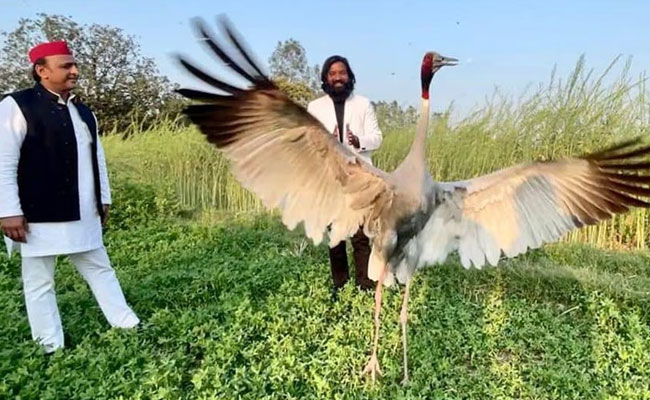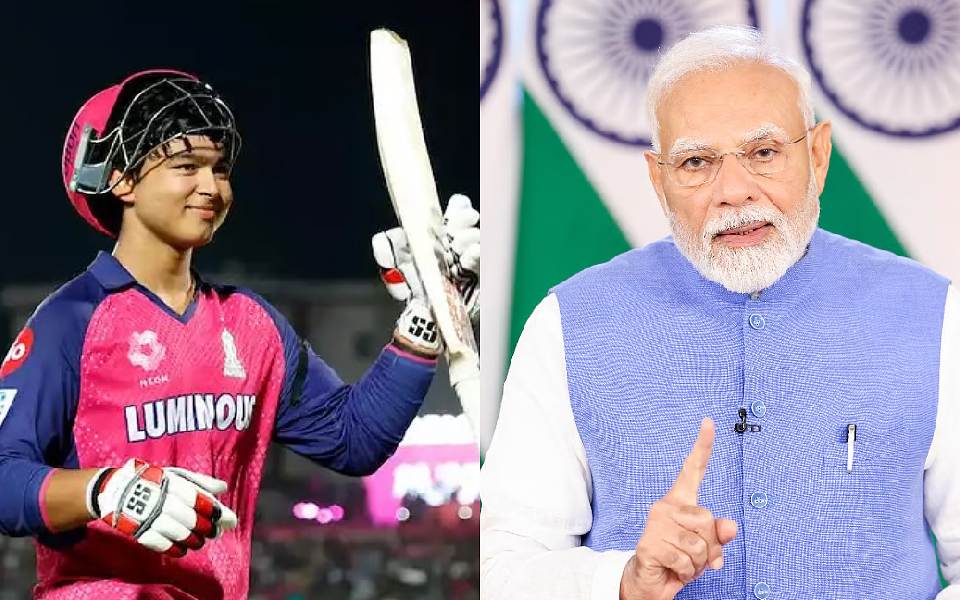Kanpur (UP) (PTI): Samajwadi Party president Akhilesh Yadav and Amethi man Arif Khan Gurjar, who cared for an injured sarus crane for a year before it was taken away by forest officials much to his dismay, were not allowed to see the bird at the Kanpur zoo with officials telling them it was under quarantine.
The crane lived with Gurjar in Amethi district's Mandkha village "like a family member" for months. But last Tuesday, forest officials shifted it to the Samaspur Bird Sanctuary in Rae Bareli so that it could live in its "natural environment". It was subsequently moved to the zoo here.
Yadav, during his Kanpur visit on Tuesday, went to the zoo with Arif to see the bird but they returned disappointed. The Samajwadi Party chief was told that the bird is under 15-day quarantine and a team of doctors is keeping a close watch on its health, a senior forest department official said, requesting anonymity.
The official, however, added the two spent about an hour there and saw the sarus on CCTV screens.
The SP chief criticised the government for taking away the bird from Arif and sending a legal notice to him.
"I went to meet Irfan Solanki, he was shifted to Maharajganj jail. I went to meet sarus, and it was sent to Kanpur zoo," Yadav said. "Action is being taken against those whom I meet. Now, I am thinking of meeting high-profile people."
He also suggested Chief Minister Yogi Adityanath establish a safari for bulls instead of sarus or reindeers.
"If the bird is sent to Etawah from Kanpur, I would be happy as there are lots of sarus cranes there," Yadav told reporters. Etawah is his home town.
The forest department officials have filed a case against Arif under relevant sections of the wildlife protection act and issued him a notice, asking him to appear and record his statement. Yadav, however, expressed hope that the government would close the case and not impose any fine on him as he just helped an injured bird.
Let the Truth be known. If you read VB and like VB, please be a VB Supporter and Help us deliver the Truth to one and all.
Dharamsala, May 4 (PTI): Rishabh Pant lost the grip on his bat and the match simultaneously as Punjab Kings rode on heroics from the two 'Singhs' -- Prabhsimran and Arshdeep -- to literally push Lucknow Super Giants to the brink of elimination with a 37-run win in an IPL match here on Sunday.
It was Prabhsimran's 48-ball 91 that formed the cornerstone of Punjab Kings' unassailable 236 for 5 and any hopes of a remarkable chase was nipped in the bud by Arshdeep's (3/16 in 4 overs) now familiar Powerplay spell which summarily destroyed the opposition top-order.
This time, he got the three top run getters -- Mitchell Marsh (0), Aiden Markram (13) and the ever-dangerous Nicholas Pooran (6) -- to swing the match decisively in Punjab's favour. Ayush Badoni's (74 off 40 balls) effort was a good one albeit it came for a losing cause.
LSG were finally restricted to 199 for 7 in 20 overs and even if they win their last three games and get to 16 points from 14 games, their net run-rate can make things difficult for them.
Punjab Kings are now placed second with 15 points from 11 games and one more win could possibly clinch a place in top four for them.
But what is becoming an eyesore is LSG's Rs 27 crore worth skipper Pant's inexplicable approach which has fetched him a dismal 128 runs in 11 innings at a sub-100 strike-rate (99.22).
On the day, he scored 18 off 17 balls and that he is completely out of sync was evident in the manner he tried to throw the proverbial kitchen sink at an Azmatullah Omarzai delivery. There was no control in his shot as the bat took off on parabolic curve towards square leg and the ball went towards deep point.
Pant's misery was a testimony of LSG's wretched campaign that was lost at the auction table when the owner decided to go with a sub-standard bowling attack based on a half-fit talented pacer Mayank Yadav.
Mayank has already lost at least 10-15 yards of pace post rehabilitation under the watch of Nitin Patel at the National Cricket Academy.
On Sunday, he went for 60 runs off four overs with half a dozen of sixes struck off his bowling.
The pint-sized Prabhsimran packed a mean punch in his strokes as he blasted his way to a 48-ball 91 with the help of six fours and seven sixes.
The Punjab keeper-batter should have got his second IPL hundred but an ambitious switch hit off Digvesh Rathi saw him head back to the pavilion, nine runs short of what would have been a deserving milestone.
Towards the end, Shashank Singh scored 33 off 15 balls to take PBKS to what looked like an unassailable total. There were 16 sixes hit by Pujab Kings with 13 coming off pacers.
Prabhsimran was initially a passive partner as it was Australian Jos Inglis who launched the first attack with a hat-trick of sixes off Mayank Yadav, whose speed has decreased by at least 15 kmph post his intense rehab under Nitin Patel at the BCCI's erstwhile National Cricket Academy to recover from back injury.
However, once Inglis was dismissed, Prabhsimran, along with skipper Shreyas Iyer (45 off 25 balls), took control of the game. They were only helped by some atrocious fielding from Avesh Khan, who would probably go down as the worst fielder in the 18-year history of IPL.
Adding insult to injury, Prabhsimran took the tall MP fast bowler to the cleaners as he was pulled over mid-wicket for back-to-back maximums. Khan went for 57 in four overs and if around 15 runs due to his misfielding is added, he caused the maximum damage for his team.
The duo of Prabhsimran and Iyer added 78 runs in 7.5 overs before Rathi, LSG's best bowler on view, became the first spinner in the current season to account for Punjab Kings skipper's wicket.
But Prabhsimran continued like a man possessed and LSG bowlers were guilty of feeding to his strengths throughout the innings.





